"If anyone's gonna piss on him, it's gonna be me!" |
Nicole Kidman (Charlottle Bliss) |
Not quite as camp or outrageous as the above quote suggests, The Paperboy still has the courage of its own misguided convictions and enough lurid excess to turn its conceited melodrama into something of a virtue.
In his recent career retrospective interview for Vulture, Steven Soderbergh confessed a fondness for late eighties/early nineties sex thrillers like Fatal Attraction and Basic Instinct. Big budget skin flicks having long since been made redundant by the internet, if like Soderbergh, you find yourself wistful for the days of softcore multiplexers and their cock-teasing lobby posters, The Paperboy is just the ticket.
A sloppy chicken bucket potboiler, featuring a big name cast having a ball playing crazy KFC caricatures, special mention must go to director Lee Daniels, doing everything he can to greasify his dish. Short of covering a frequently shirtless Zac Efron in coconut oil, Daniels lubricates his lens so that the film itself looks sticky and soiled. Using a 2.40:1 frame center-cut format extracted from a Super 16 film negative, DP Roberto Schaefer's, sweltering landscapes come out looking like 70s smut Jack Horner might have shot in his heyday when viewed on a clapped out television. His overexposed, sunburnt photography is marvelous, even when it evokes the Los Angeles underworld as much as the Florida swamps. And just like the not-so-clean-shaven characters that populated porn of the period, every actor regardless of status, is dressed down (this takes on a whole different meaning in the case of Efron), appearing as unseemly and unsavory as possible.
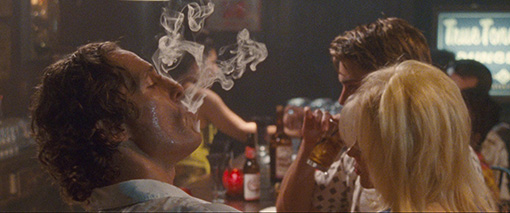
Beginning with the murder of a sheriff whose racism is out of bounds even for the South in 1969, the perpetrator Hillary Van Wetter (John Cusack) awaits his death sentence in the local jail. Ward James (Matthew McConaughey) is a reporter looking for his big break whilst working for his father's newspaper, which has a reputation for upholding civil rights, and putting the spotlight on the unjustly accused. Believing Van Wetter to be innocent, Ward's approach to the story and his methods of writing it are indicative of a quantum shift crumble in journalistic integrity and the beginnings of the insidious entertainment angle that slants today's top stories.
As co-author and investigator on the piece, Ward brings Yardley Acheman (David Oyelowo) back with him to his hometown. A snooty writer from the Miami Times, Yardley's incongruous English accent and disapproving manner raises enough of a stir, never mind his being a black man in a position of authority who dares to see himself an equal to the whites. Ward is the nuts-and-bolts fact finder while Yardley works on presentation, putting those facts in "perspective" in order to sell more papers. It's an ethically thorny tract that Daniels quickly discards in favour of the more tawdry business he's obviously more interested in.
That being the cautionary wet dream romance between Ward's younger brother Jack (Zac Efron) acting as the duo's driver, and Van Wetter's prison bride-to-be Charlotte Bless (Nicole Kidman; the clichéd epitome of wig-wearing trailer-trash drawn to men behind bars), who accompanies Ward to the jailhouse in person so as to grant him an audience with Van Wetter.
Watching respectable stars aggressively playing against type as duplicitous nasties with bulging bags of dirty laundry, is undeniably the main draw here. Working without a safety net, Daniels parades his all-too trusting stars around like a farmer leading cattle to the slaughterhouse and you spend much of the film wondering what dirt he must have on them to make them appear as they do here.
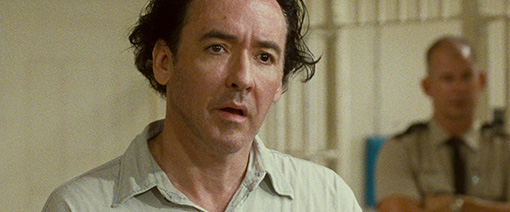
Whenever he's on screen, you can't look away from a never sweatier, slovenly, strung-out John Cusack, especially once cinema's archetypal nice guy goes full-on loon, raping and wielding a machete with intent to kill. Completely flipping the script on his southern gent, social dandy from Midnight in the Garden of Good and Evil, you'll never look at Cusack the same way again.
Similarly, McConaughey's Ward is the uglier face of his righteous southern lawyer in A Time to Kill, right down to his unsightly facial scars and overly oiled locks. Far from the upstanding crusader of justice he pretends to be, Ward's a sexual self-destructive, looking to write his ticket out of shit-shack Florida to anywhere he doesn't have to indulge his perverse pleasures behind closed doors.
McConaughey's contractual obligation for removing his shirt goes without saying, but where previously he walked his abs around Kate Hudson vehicles in harmless fashion, Daniels puts McConaughey in sexually compromising positions and blows a big load all over his pin-up image. The way Daniels' voyeuristic camera leeringly captures scenes of sodomy, holding shots closer and longer than need be, makes it all to clear where his intentions lie.
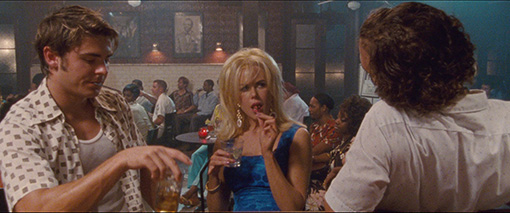
Openly gay, Daniels is his own worst enemy when it comes to finding a torrid B-movie groove and pushing his late night sexploitation as far as it's begging to go. His direction and outfitting of Kidman is a prime example, too often confusing camp for vamp.
Thrusting her boobs up in a vacuum-sealed dress and tottering on hooker stilettos, Kidman is hot, horny and hilarious in big hair and false eyelashes. Initially it's a thrill to see the painfully reserved and somewhat aloof A-lister letting it all hang out until you realise she's actually still very much on a leash.
When Charlotte remarks to a jealous Jack that "fucking a man's the most natural thing in the world", it's painfully apparent that such predatory sexuality does not come naturally or easily to Kidman at all. Despite completely nailing a similar role years before in To Die For, one only needs to look at how frigid and uncomfortable she appears in Eyes Wide Shut for an idea of what I'm getting at.
All her smoldering and pouting feels calculated rather than something she's readily able to tap into. Kidman took the part 'cause she liked the idea of acting outside of her comfort zone (the special features attest that this was the case for almost all the actors) but clearly, she doesn't quite know what to do with herself once she goes out of bounds.
That's not to say she doesn't commit wholeheartedly. Kidman throws herself into a "telepathic" sex scene with John Cusack with such gusto it earns incredulous, unintentional laughter. And that's not a body double you're watching pee all over Zac Efron after a gang of jellyfish sting him to buggery.
Unfortunately, in both instances, Kidman's game-for-anything enthusiasm is all for naught thanks to Daniels' appalling camera placement and prudish cutting. While performing air fellatio for Hillary in front of Ward, Jack and Yardley at the jail, Charlotte's ordered to spread her legs in a shot that imitates Basic Instinct without going half as far.
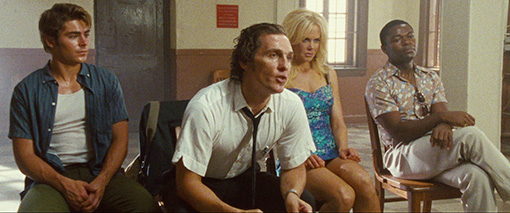
Already infamous on the internet after a disastrous reception at Cannes, the beach urination scene is little more than a not-angled-quite-right, static up-skirt shot, punched in so close you can't even tell that's actually Kidman widdling in her co-star's face. Sure, it's a ballsy performance, but Golden Globe and SAG nominations for sex acts that voters probably considered "brave" and "revealing" are literally taking the piss. The nominations make even less sense in light of how Daniels denies us the pleasure of seeing Kidman put herself out there in shameless award-courting fashion.
Cutting from a stream of unidentifiable piss to an impossibly distant wide shot that turns Kidman and Efron into soft focus stick figures, the clumsy handling of the scene is far more ridiculous than the act itself. If we've really stooped so low as to start nominating people for the provocative "bravery" of softcore degradation then at least cut them in a way that doesn't take us out of the experience of watching an actress go to the trouble of making herself sexually vulnerable. And if we're going to compare, then Gina Gershon's drumstick blowjob scene in Killer Joe wins hands down. By not shying away in the edit and focusing on performance, Gershon is able to own her moment of humiliation.
If Kidman is not quite the bomb of sexual energy the script requires, that's only because Daniels' attention is so distracted by the allure of Efron's tight bod, unable to fully focus on Charlotte's seduction of Jack. Not so much a coming of age story than a celebration of a fop-haired boy becoming a ripped, hunky man, the plot shamelessly jumps through hoops to get Efron in his tighty whities as often as possible. The drinking game here is not how many times the one time Disney kid's southern accent drops, but how many times he drops his trousers.
After wading through swampland thickets, Jack once again finds himself without threads and after borrowing some of Yardley's clothes, minutes later an enraged Yardley orders him to strip off. Important character scenes have Jack distractedly lounging around in a state of undress and a big emotional moment in which he apologizes to his maid (Macy Gray) for a racist outburst, sees him rushing downstairs and embracing her in his briefs.
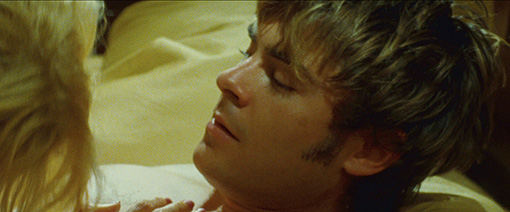
It's during Efron's sex scene with Kidman that Daniels shows himself to be an equal opportunity offender. As soon as he's got the money shot of Efron's rippling six-pack, the maid's wildly haphazard voiceover interrupts, proclaiming that we've seen enough. It's one thing for a fuck puppet like Charlotte to keep her bra on during a coy sex scene complete with an old-fashioned fade to black, but it's an incredulity too far that it stays on at all times, even as Hillary is forcing himself upon her over the washing machine. The bra is the first thing a sexually wound up felon would have gone for, but Daniels' camera is more concerned with lingering on John Cusack's naked ass, pretentiously and pointlessly cross-cutting to dead wildlife between thrusts.
If this is one of many deluded instances of Daniels aiming to make high art with nonsensical symbolism and inane split screen edits, the end result is closer to high trash and all the better for it. It's certainly no Mommie Dearest, but to be fair, it's not exactly To Kill a Mockingbird either. Working best as Florida noir, wherein the confounding directorial decisions can be read as contributions to a tacky sense of atmosphere and the violence suddenly doesn't seem so shockingly abrupt, this scuzzy bit of down south jukin' is an insanely ludicrous, compulsively watchable pleasure without any of the guilt.
As indicated above, the film was shot on Super-16mm Kodak stock and cropped to produce the 2.40:1 frame here, which was then blown up to 35mm via a 2K digital intermediate. The purpose was clearly to recreate the look of a specific style of 70s American cinema, something the transfer here absolutely nails, the very visible film grain, slightly faded colour and earthy interiors having a most convincingly retro feel. The contrast is also pitched about right, achieving a pleasing range without displaying the punchiness of more modern 35mm film stocks. This does make it tougher to recommed the Blu-ray over the DVD, as the grainy 16mm image is intentionally lacking the pin-sharp crispness of digital and top-flight 35mm, but the image still has a richness of texture that tend to give HD transfers the edge, and the detail on some of of the daylight exteriors is just about good enough to justify the Blu-ray release.
The retro feel of the image has been extended to the soundtrack, which although clearly recorded and cleanly mixed, appears to have had its dynamic range toned down a little to give more of authentic 70s feel. This does mean that the Dolby TrueHD 5.1 surround track rarely gets to flex its muscles and makes only limited use of the surrounds, usually for music. The real surprise is how different the mix is on the accompanying Dolby stereo 2.0 track, where the whole thing has a more prominent treble bias and the ambient sound is considerably louder and cruder, to the point where you can hear sounds here that are almost imperceptible on the 5.1 track.
Cast Interviews (17:49)
Producer Hilary Shor talks of it being a risky time in the business and that due to a paucity of material, bigger stars are willing to take bigger risks. In talking about the cast she singles out Zac Efron ("No one is going to have more of a change in his career after this movie"), managing to keep a straight face while talking about his extraordinary spirit, yet not once mentioning his extraordinary bod.
John Cusack talks about the source material, and the story's concern with very human creatures who aren't particularly cinematic. He acknowledges that in movie language, his character would be the bad guy whereas in the tragic language of The Paperboy, he's this otherworldly creature initiating Jack in some way.
Nicole Kidman enthuses about being cast against type, and how Lee Daniels believed she could play a role like this when most directors would be inclined to think otherwise. She fawningly describes Daniels as a 'rebel filmmaker.' Matthew McConaughey expresses similar sentiments about the daring nature of his role and how he didn't know what he was getting into. He makes the most interesting observation of the entire cast when he points out that no two characters in the film are remotely close to being on the same frequency.
This segment also features back-slapping contributions from Zac Efron, Macy Gray and David Oyelowo. It ends with Scott Glenn, evidently very pleased at being given a rare opportunity to play weakness in this film as opposed to strength. He describes the film as "a take on 1969 that no one has ever seen before."
Lee Daniels Director Interview (4:08)
Daniels waxes lyrical about his love of both the novel and early drafts of the script (before he came on-board as co-writer), and giving voice to characters you don't usually see, just as he did in Precious. As well as talking casting actors against type, he mentions his initial resistance to casting Zac Efron until he saw Me and Orson Welles with his boyfriend, though he struggles to remember the film's title.
Behind the Scenes (7:03)
B-roll in which we see lots of on set creative decisions being made, but are unable hear much of the banter between the director and his stars. It's made up of an extended look at the prison scene, where they first go to visit John Cusack, and also a pivotal bar scene.
Featurette (6:14)
Essentially the interviews re-cut together with clips from the film.
A hot, horny mess of a film, whose seedy beauty can really be appreciated on Blu-ray, The Paperboy is a cheap thrill ride of jaw dropping incompetence at times, a once in a lifetime confluence of top-line talent and reckless filmmaking. The disc could really have done with a commentary, just to hear Lee Daniels artistically explain away his unashamed ogling of Zac Efron which so often gets in the way of the storytelling. If you like your B-movies very, very lewd, I can't recommend it enough.
The Paperboy will be released in UK cinemas on 15th March 2013 by Lionsgate.
|